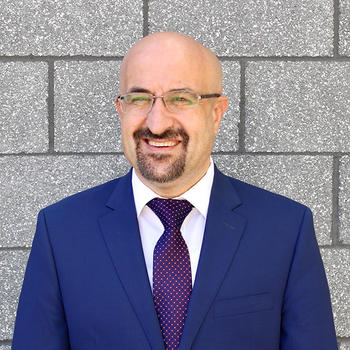In This Story
George Mason University, in partnership with the Government Technology and Services Coalition’s (GTSC) publication Homeland Security Today, will host the inaugural “Counterterrorism 2025: Terrorism Trends, Tactics, and Targets” summit on Tuesday, June 3, at Van Metre Hall at Mason Square in Arlington, Virginia. This full-day event will explore the shifting dynamics of global terrorism and the strategies being developed to confront emerging threats.

The summit is convened by the Global Terrorism Trends and Analysis Center (GTTAC) at the Schar School of Policy and Government’s Terrorism, Transnational Crime and Corruption Center (TraCCC). The conference represents a collaborative effort to address the multifaceted challenges of modern terrorism. By bringing together experts from various sectors, the conversations aim to foster innovation and strengthen strategies to combat these evolving threats.
The event is open to the public but registration is required at this web page.
“It is important to have these conversations now because the nature of terrorism is rapidly evolving,” said Associate Professor Mahmut Cengiz, who leads the GTTAC and organized the summit. “Traditional distinctions between terrorist groups, state actors, gangs, and cartels are increasingly blurred, especially as nonstate actors gain access to advanced technologies such as drones, cyber tools, and encrypted communications.”
The recent designation of Mexican cartels as terrorist organizations by the federal government highlights this shift, he said, “raising important questions about how these groups should be legally and strategically addressed.
“These developments require new thinking, updated policies, and cross-sector collaboration—achievable only when experts from government, academia, and security agencies come together to share insights and shape coordinated responses.”
The symposium begins at 8:30 a.m. and ends at 5:30 p.m. and will feature sessions on pressing threats, including international and state-sponsored terrorism, lone actors, and newly designated terrorist groups such as Mexican cartels and international gangs. While U.S. counterterrorism efforts have thwarted many ISIS and Al-Qaeda attacks, these groups remain active globally, particularly in regions including Asia, Africa, and the Middle East. State-sponsored terrorism, especially from Iran-backed organizations such as Hamas, Hezbollah, and the Houthis, continues to destabilize global security.
The summit will also address evolving tactics used by terrorist organizations, including cyber terrorism, the use of drones for surveillance and attacks, the threat of weapons of mass destruction (WMDs), and the growing danger of improvised explosive devices (IEDs). These technologies and tactics pose significant challenges to counterterrorism strategies, requiring a multifaceted approach to mitigate their impact.
Discussions will focus on how data analytics, enhanced information sharing, and counter-narrative campaigns can help respond to these complex and rapidly evolving threats. Initiatives such as TraCCC’s GTTAC, which plays a pivotal role in collecting and analyzing global terrorism data for the U.S. Department of State, will be highlighted as essential components of a comprehensive counterterrorism strategy.
In addition to panel discussions, the summit will feature poster presentations by GTTAC analysts on critical terrorism topics and counterterrorism approaches.
